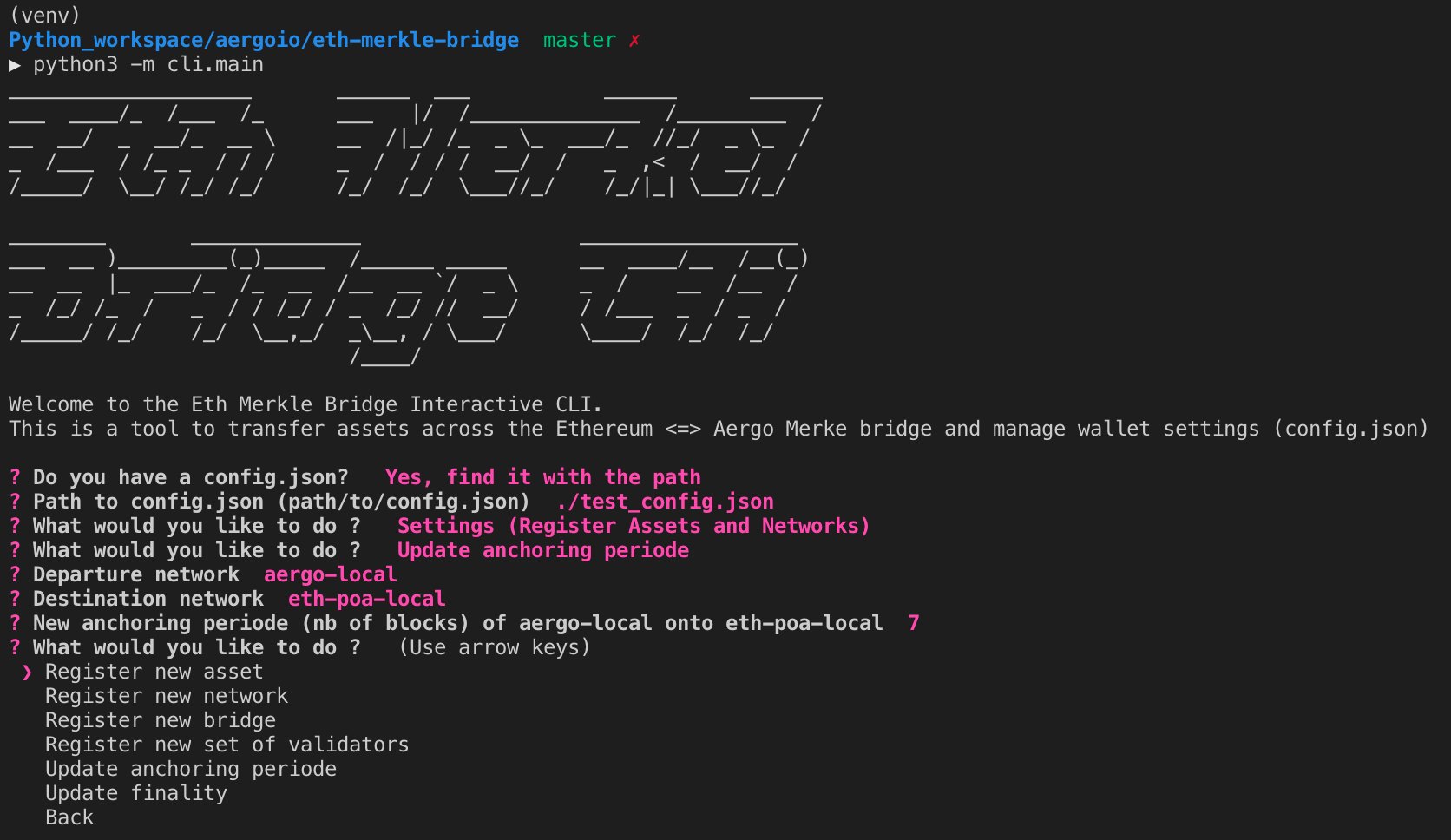Validator¶
A validator will sign any state root from any proposer via the GetAnchorSignature rpc request as long as it is valid. Therefore a validator must run a full node. Assets on the sidechain are secure as long as 2/3 of the validators validate both chains and are honnest. Since signature verification only happens when anchoring (and not when transfering assets), the number of validators can be very high as the signature verification cost is necessary only once per anchor.
Starting a Validator¶
$ python3 -m ethaergo_bridge_operator.validator.server --help
usage: server.py [-h] -c CONFIG_FILE_PATH -a AERGO -e ETH -i VALIDATOR_INDEX
[--privkey_name PRIVKEY_NAME] [--anchoring_on]
[--auto_update] [--oracle_update] [--local_test]
Start a validator on Ethereum and Aergo.
optional arguments:
-h, --help show this help message and exit
-c CONFIG_FILE_PATH, --config_file_path CONFIG_FILE_PATH
Path to config.json
-a AERGO, --aergo AERGO
Name of Aergo network in config file
-e ETH, --eth ETH Name of Ethereum network in config file
-i VALIDATOR_INDEX, --validator_index VALIDATOR_INDEX
Index of the validator in the ordered list of
validators
--privkey_name PRIVKEY_NAME
Name of account in config file to sign anchors
--anchoring_on Enable anchoring (can be diseabled when wanting to
only update settings)
--auto_update Update bridge contract when settings change in config
file
--oracle_update Update bridge contract when validators or oracle addr
change in config file
--local_test Start all validators locally for convenient testing
$ python3 -m ethaergo_bridge_operator.validator.server -c './test_config.json' -a 'aergo-local' -e 'eth-poa-local' --validator_index 1 --privkey_name "validator" --auto_update
"Connect Aergo and Ethereum"
"Current Aergo validators : ['AmNLjcxUDmxeGZL7F8bqyaGt3zqog5HAoJmFBEZAx1RvfTKLSBsQ', 'AmNLjcxUDmxeGZL7F8bqyaGt3zqog5HAoJmFBEZAx1RvfTKLSBsQ', 'AmNLjcxUDmxeGZL7F8bqyaGt3zqog5HAoJmFBEZAx1RvfTKLSBsQ']"
"Current Ethereum validators : ['0x210467b3849a408c3a3bEE14b4627aa57F342134', '0x210467b3849a408c3a3bEE14b4627aa57F342134', '0x210467b3849a408c3a3bEE14b4627aa57F342134']"
"aergo-local <- eth-poa-local (t_final=4) : t_anchor=6"
"aergo-local (t_final=5) -> eth-poa-local : t_anchor=7"
"WARNING: This validator will vote for settings update in config.json"
Decrypt Aergo and Ethereum accounts 'validator'
Password:
"Aergo validator Address: AmNLjcxUDmxeGZL7F8bqyaGt3zqog5HAoJmFBEZAx1RvfTKLSBsQ"
"Ethereum validator Address: 0x210467b3849a408c3a3bEE14b4627aa57F342134"
"server 1 started"
{"val_index": 1, "signed": true, "type": "⚓ anchor", "value": {"root": "0xd97d33cb90c9e58befdba86467907ba68258b49f0f85a22781db7c4eda3033e4", "height": 8102}, "destination": "aergo-local", "nonce": 0}
{"val_index": 1, "signed": true, "type": "⚓ anchor", "value": {"root": "0x5d471941372b64d66361c29fca4e13c899819afe212cce87143794d80b510613", "height": 8119}, "destination": "eth-poa-local", "nonce": 0}
Updating bridge settings¶
The information (validator set, anchoring periods, finality of blockchains) contained in the config file will be used by the validator to vote on changes if –auto_update is enabled. Be careful that the information in config file is correct as any proposer can request a signature of that information. If the proposer gathers 2/3 signatures for the same information them the bridge settings can be updated.
